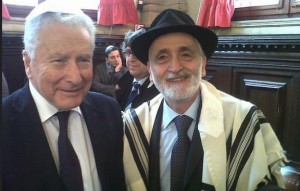NEWS Venice Greets Its New Chief Rabbi
“In the past, Judaism has given the world the rules of ethics through the Ten Commandments, teaching basic concepts such as justice and love for others and for the stranger. In spite of that Jewish principles are not fully applied in society today. We live in an age in which man has no points of reference. If there is an element that characterizes Jewish history and identity, it is awareness of knowing where we come from and where we want and need to go”.
This message was sent by the new Chief Rabbi of Venice Scialom Bahbout during the inauguration ceremony that marked, in an official way, the beginning of his work in the Community.
Rav Scialom Bahbout was born in Tripoli (Libya) and moved to Italy in 1954. He received his semikha (Rabbinical degree) from the Italian Rabbinical College and his degree in Physics from the University La Sapienza of Rome: among his teachers, Bahbout had brilliant figures such as rav Elia Artom and rav Elio Toaff.
Between 1968 and 1971 he was the Chief Rabbi of Bologna, and between 2010 and 2014 he held the same position in Naples contributing to the development of many projects about rediscovering Jewish roots and Jewish memories in Southern Italy.
Bahbout’s position in Bologna was highlighted by the president of the Union of Italian Jewish Communities Renzo Gattegna: “The research and the dialogue with the descendants of the Marranos, the conversos, the victims of the atrocities of the Spanish Inquisition, has such a moral value, as well as ethical and religious one, that I openly express the hope that rav Bahbout will continue in that commitment along with his work as chief rabbi of the Community of Venice.”
On the Tevah, among others, were also rav Giuseppe Momigliano, president of the Italian Rabbinical Council; Paolo Gnignati, president of the Jewish Community of Venice; rav Menachem Genack, general director of Orthodox Union; the prefect Domenico Cuttaia, as well as special commissioner Vittorio Zappalorto. During the ceremony, conducted by the journalist and Community board member Paolo Navarro Dina, the tenor Claudio Di Segni sang songs of the music by the Venetian composer Benedetto Marcello who, in 1720, produced the first example of interreligious dialogue in art by introducing in its melodies Jewish tradition, Greek-Orthodox sounds and Gregorian chant.

